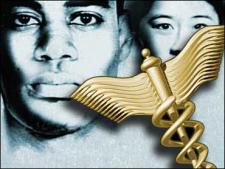Is there a racial "care gap" in medical treatment? [Video]
By Gwen Ifill,
PBS NewsHour
| 04. 05. 2016
[With CGS Advisory Board Member Dorothy Roberts]
<span id="XinhaEditingPostion"></span><span id="XinhaEditingPostion"></span>
A new survey has found implicit biases in medical students that may explain why black patients are sometimes undertreated for pain, with some students believing that black people feel less pain and have thicker skin than white people.
Reporter: Gwen Ifill, NewsHour
Interviewees:
- Dorothy Roberts, JD, University of Pennsylvania.
- David Satin, MD, University of Minnesota
More info:
Related Articles
By Grace Won, KQED [with CGS' Katie Hasson] | 12.02.2025
In the U.S., it’s illegal to edit genes in human embryos with the intention of creating a genetically engineered baby. But according to the Wall Street Journal, Bay Area startups are focused on just that. It wouldn’t be the first...
Several recent Biopolitical Times posts (1, 2, 3, 4) have called attention to the alarmingly rapid commercialization of “designer baby” technologies: polygenic embryo screening (especially its use to purportedly screen for traits like intelligence), in vitro gametogenesis (lab-made eggs and sperm), and heritable genome editing (also termed embryo editing or reproductive gene editing). Those three, together with artificial wombs, have been dubbed the “Gattaca stack” by Brian Armstrong, CEO of the cryptocurrency company...
Alice Wong, founder of the Disability Visibility Project, MacArthur Genius, liberationist, storyteller, writer, and friend of CGS, died on November 14. Alice shone a bright light on pervasive ableism in our society. She articulated how people with disabilities are limited not by an inability to do things but by systemic segregation and discrimination, the de-prioritization of accessibility, and the devaluation of their lives.
We at CGS learned so much from Alice about disability justice, which goes beyond rights...
By Adam Feuerstein, Stat | 11.20.2025
The Food and Drug Administration was more than likely correct to reject Biohaven Pharmaceuticals’ treatment for spinocerebellar ataxia, a rare and debilitating neurodegenerative disease. At the very least, the decision announced Tuesday night was not a surprise to anyone paying attention. Approval...




